Even though the U.S. has temporarily reduced the extraordinarily high import tariffs it imposed on most countries — including a couple of islands off Antarctica that are solely inhabited by penguins — those actions continue to disrupt global trade.
The impact is being felt especially hard by global automotive and machinery manufacturers. The effect of the on-again-off-again tariffs is not only to disrupt corporations around the world and threaten jobs outside the U.S., but to impact consumers and businesses inside the U.S. as well.
Follow all our coverage of the tariffs situation here
Read Also

Saskatchewan farmer uses tile drainage to manage water
The integration of both irrigation and tile drainage results in higher yields, water efficiency, improved soils and less nutrient runoff, says one producer.
The net result is, as almost all economists publicly predicted, to cause economic harm to everyone involved.
There are now numerous reports that vehicle imports to the U.S. are being temporarily stopped due to the uncertainty around tariffs. And shipments in many other industry segments have also slowed, according to shipping firms.
Numerous sources are now confirming that German automaker Audi has ordered all vehicles delivered to U.S. ports after April 2 to remain there and not be distributed. April 2 is the date a 25 per cent tariff came into force for vehicles manufactured outside the U.S.
The automaker reportedly has a three-month supply of vehicles at dealers in the U.S., but it will eventually need to make a final decision on when to release those vehicles into the market.
British auto manufacturer Jaguar Land Rover has halted shipments of vehicles to the U.S., as well.
Porsche told industry analysts on April 9 that the company had shipped an increased inventory of cars to the U.S. ahead of the expected tariff announcement, and it has since issued a 90-day pause on any further shipments, pending “further clarification” of the tariff rules.
A headline at the Financial Times sums up the problem “U.S. tariffs cause import car pileups at American ports”.
CNH Industrial, parent company of Case IH and New Holland, had temporarily stopped shipments of farm equipment from its U.S. plants because of pricing uncertainty around tariffs, but it has now resumed them. However, reports are that shipments of equipment to the U.S. from its plants in other countries remains paused.
When asked for comment, CNH replied only that “In North America, we have resumed shipment of sold units. Impact to future orders will be announced at a later time.”
“What we’re seeing in the market is people are holding on and holding everything up,” said the CEO of international logistics firm Henco Global, Simon Cohen, when speaking on CNBC’s State of Freight broadcast. “Right now, after the latest news, people are starting to make some imports to the United States, because of the urgent products, but the rest is on hold. It’s a tense calm.
“The industry is holding a little and just waiting for the news to move forward. People are sending what’s urgent and needed, but they’re afraid of getting tariffs imposed.”


















